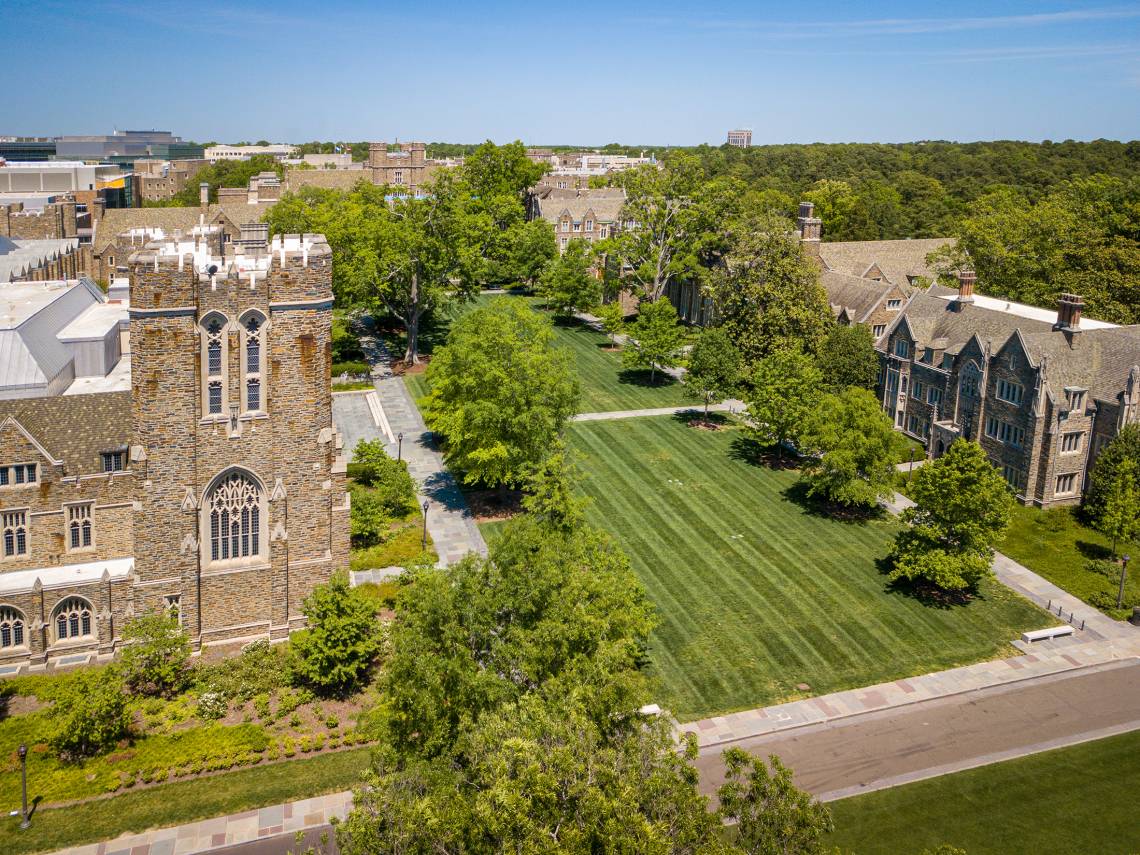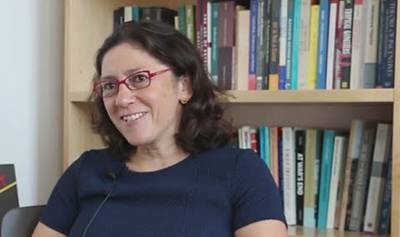New Academic Council Chair Erika Weinthal Looks to Build Faculty Community During a Pandemic

 After a long record of university service, new Academic Council Chair Erika Weinthal takes office with a responsibility only one other Council chair has had before: Helping faculty and the university community create a robust academic and campus environment in the middle of a persistent pandemic.
After a long record of university service, new Academic Council Chair Erika Weinthal takes office with a responsibility only one other Council chair has had before: Helping faculty and the university community create a robust academic and campus environment in the middle of a persistent pandemic.
Weinthal’s cautious optimism in Duke’s ability to handle this ongoing challenge comes from the university’s demonstrated success in managing the pandemic by relying on faculty expertise and guidance.
“Duke’s policies continue to be informed by our infectious disease and public health experts,” said Weinthal, a professor of environmental policy with a primary appointment in the Nicholas School and a secondary appointment in the Sanford School. She began her two-year term as Council chair on July 1.
It is that expert faculty advice that convinced the administration to move forward with in-person learning and a full residential life while relying on vaccinations, heavy use of masks and social distancing plus a system of surveillance testing and contact tracing that helped keep the campus safe last year. That same faculty advice was behind several COVID policy changes announced on August 30.
“We know the situation can change at any moment. Much depends on how we as a community work together to keep each other safe. And I can’t underscore enough that this requires a collective effort.”
“I hope we can all work together to navigate ways to support each other to ensure that we can teach safely and do so with empathy.”
As leader of the Academic Council, Weinthal participated in several activities during Orientation Week and saw the excitement of the students to be back on campus and interacting with faculty members.
“What is clear is Duke began the fall semester in a comparatively good position with a high percentage of our faculty, staff and students vaccinated.”
“I’ve heard from faculty members who are excited to be in the classroom,” Weinthal said. “I’ve also heard from those who have concerns. Many have young children who are not eligible yet to be vaccinated or they might be caring for elderly parents. It’s a wide range of comfort level.”
“Much depends on how we as a community work together to keep each other safe. And I can’t underscore enough that this requires a collective effort.”
-- Erika Weinthal
As the semester starts, Weinthal has a long list of academic, financial and governance issues identified for the Council to consider this year. But she said the pandemic will take precedence, at least at the beginning.
One pandemic issue that has Weinthal’s attention is the onboarding of new faculty and the rebuilding of a community of faculty members who have had little in-person contact for a year and a half. This year the university will welcome to campus two classes of new faculty members who have little experience with faculty life and university governance.
“That’s an extra challenge after a year and a half of learning and faculty meetings all online,” Weinthal said. “The pandemic has created a disruption to university community. Working and meeting online is not the same as walking and talking on campus, sharing coffee or lunch, writing a paper together in person. This communal engagement is essential to teaching and scholarship at Duke.”
“In addition, last year’s new faculty haven’t experienced the full benefits of an active and engaged campus along with its robust governance model. We want them to know what it means to be a faculty member at Duke and to encourage them to be involved in university life and particularly its governance. The critical role of the faculty in the university governance model is crucial to building a strong faculty community. It affects mentorship, the ability to exchange ideas and it affects teaching.”
Weinthal is the third consecutive Academic Council chair with a policy background, following Don Taylor and Kerry Haynie. Weinthal’s graduate training was in political science, but her academic expertise is in global environmental policy, with a focus on water and energy. A first-generation college student whose father was a refugee from Nazi Germany, Weinthal’s research came out of her interest in post-conflict peace building.
That background is supplemented by a long record of university service, including several terms on the Council and as a member of the Executive Committee of the Academic Council in 2017-19. She said her role is to help faculty be involved early and in important ways in “the deep part of university strategic planning.”
“Governing is a process, and that process teaches us as much as the decision that results. This engagement in the important university issues is essential to the community building that helps the university run effectively.”
“Faculty will get to hear about the impact of the pandemic on university finances and academic life early in the semester,” she said.
“Last year, we didn’t have a lot of new programs going forward. Last year was all about keeping things steady.” But looking ahead, she said there are previously planned strategic initiatives that need to be advanced and financed, and consideration of lessons learned during a year of remote learning and campus life.
Another pandemic-impacted issue will be reviewing Duke’s global strategies, something that Weinthal has been involved in for a long time through her scholarship in Russia, Africa, the Middle East and elsewhere.
“Faculty research depends on being in the field working with partners across the world and presenting papers at international meetings,” she said. “Students too are eager to do research for their undergraduate and graduate theses. So, a discussion on how to rebuild global community will be critical.”
Other agenda items this semester include consideration of new programs, the university’s anti-racism effort and the results of the first-ever university-wide climate survey.